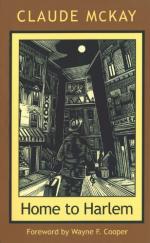|
This section contains 2,601 words (approx. 9 pages at 300 words per page) |

|
Dictionary of Literary Biography on Festus Claudius McKay
What is generally termed the Harlem Renaissance, a decade of black self-awareness and racial pride, is frequently dated from the appearance in print of Claude McKay 's great sonnet "If We Must Die," which commemorated the cataclysmic race riots in the United States during the second half of 1919. So great was the effect of that poem that McKay has been proposed as the founder of the Harlem Renaissance and as the prototype of the modern black social-realist contributor to American culture. When in 1925 Alain Locke (the Howard University philosopher and recorder of black literary and artistic achievement) wrote about the "New Negro," he was thinking about those who, in effect, followed in McKay's path in taking pride in African culture, in Negro racial self-consciousness, and in black folkways. After achieving international renown as a poet, McKay experimented with the realist short story; became a professional journalist and editor...
|
This section contains 2,601 words (approx. 9 pages at 300 words per page) |

|


